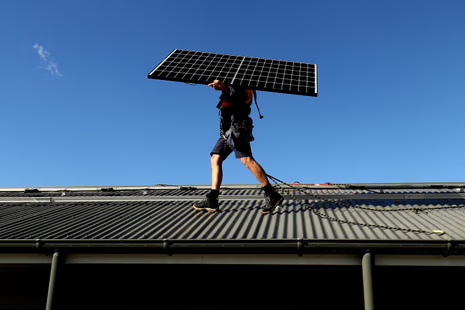Switching from Subsidies to Market-Based Rewards
In its preliminary report titled “Investing in cheaper, cleaner energy and net zero transformation,” the Productivity Commission of Australia suggests that significant renewable energy subsidy programs like the Renewable Energy Target (RET) and Capacity Investment Scheme (CIS) be discontinued by 2030. To promote the clean energy transition in a way that is both economical and productivity-aligned, these ought to be swapped out with market-based, technology-neutral incentives.
🚫 More extensive emissions controls but no carbon tax
The Commission supports extending the Safeguard Mechanism by reducing its emissions threshold from 100,000 to 25,000 tons CO₂ equivalent annually, bringing more polluters under greater regulatory supervision, without explicitly advocating for a wide carbon tax.
More stringent emissions regulations without a carbon tax
Without specifically calling for a broad carbon price, the Commission is in favor of expanding the Safeguard Mechanism by lowering its emissions threshold from 100,000 to 25,000 tons CO₂ equivalent yearly, putting more polluters under closer regulatory scrutiny.
Developing Climate Resilience and Changing Incentive Structures
The paper suggests creating a star-rating system for home resilience and a public climate hazard database to improve climate resilience and assist in guiding decisions made by builders and households. Additionally, it suggests eliminating tax benefits particular to EVs (such as fringe benefits tax exemptions) and implementing pollution incentives for large vehicles.
Building Resilient Climate Systems and Adapting Incentive Frameworks
To increase climate resilience and help guide decisions made by homeowners and builders, the study proposes the creation of a public climate hazard database and a star-rating system for home resilience. It also recommends introducing pollution incentives for heavy vehicles and doing away with tax benefits specific to EVs, like fringe benefits tax deductions.
🧭 Bottom Line
The interim report from the Productivity Commission proposes a strategy change: beyond 2030, large subsidies will be replaced with decentralized, market-driven procedures. In order to match Australia’s emissions reduction strategy with productivity gains and long-term economic competitiveness, this policy vision seeks to improve regulatory efficiency, broaden the scope of environmental oversight, and integrate climate resilience into housing and infrastructure.
Source : theguardian




